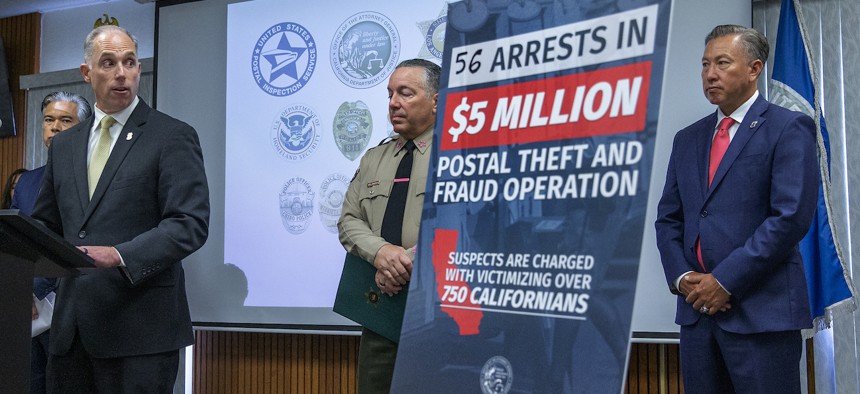
An October 2022 press conference at the U.S. Postal Inspection Service in Pasadena, announced the arrest of 56 individuals involved in a widespread mail theft and postal fraud operation resulting in the theft of nearly $5 million from hundreds of people. Mel Melcon/Getty Images
USPS significantly ramps up payouts for those who help convict mail thieves
The Postal Service touts progress in crime crack down despite pushback from watchdogs and employee groups.
The U.S. Postal Service will offer up to $250,000 to individuals who provide information that leads to an arrest and conviction of those who assault USPS employees as the agency looks to ramp up its efforts to combat rising mail-related crime.
The rewards offered for six separate crime categories will increase between two and 10 times existing payouts, USPS officials announced on Wednesday, calling the boosts necessary to combat the increased rates of robberies and assaults of postal employees and property. The officials touted preliminary results from the efforts USPS began implementing earlier this year to make the mail and letter carriers less vulnerable to crime, though those programs are still in their early phases.
“We have effectively focused our efforts with USPS on hardening both physical and digital targets to combat threats to postal employees and secure the mail,” said Gary Barksldale, chief of the Postal Inspection Service. “We continue to turn up the pressure and put potential perpetrators on notice. If you attack postal employees, steal the mail, or commit other postal crimes, postal inspectors will bring you to justice.”
From May to September, the inspection service launched a targeted campaign using a “strategic hyperlocal approach” that focused on mail crime in San Francisco, Chicago and three cities in Ohio. The areas were selected due to the “significant threats from organized postal crime” each faced, according to Brendan Donahue, the USPIS assistant postal inspector in charge, and the campaigns involved several different agencies. That led to 700 investigative actions and 600 arrests, including 109 for robbery and 530 for mail theft.
Earlier this year, USPS conceded it was far outpacing prior year rates of letter carriers being robbed on the job and blue collection boxes being broken into. To confront the problem, USPS is releasing 12,000 “high security” boxes in high-risk areas around the country. The boxes are hardened to make access more difficult for criminals. It is also replacing the universal keys that give letter carriers access to collection boxes, cluster boxes and apartment panels—known as “arrow” keys—with an electronic alternative.
USPS is deploying 49,000 “e-arrow keys”—and has so far sent out 6,500—which add additional security for opening boxes. That represents just 13% of the arrow keys USPS has in circulation, according to a recent inspector general report. It is replacing less than 10% of its 140,000 blue collection boxes.
Joshua Colin, USPS' chief retail and delivery officer, said the efforts will continue to evolve but the impact will be greater as word spreads that the agency is making changes.
“I think as we communicate the expectations to the public, and we put these boxes up it's going to eventually get down to the culprits who are tempted to break into these boxes,” Colin said. “Eventually the word will get out.”
The USPS IG has criticized postal management’s plan as insufficient and incomplete, noting it does not have plans beyond its initial pilots.
The increasing of rewards for those who assist in criminal investigations marks a new step for the Postal Service as it continues to confront what Postmaster General Louis DeJoy on Wednesday called a nationwide “sustained crime wave.” The payout for information related to the arrest and conviction of an individual charged with murder or manslaughter or a postal employee on duty will jump from $100,000 to $250,000, assault or robbery of employees from $50,000 to $150,000, mail or property theft from $10,000 to $100,000, burglary of a post office from $10,000 to $100,000 and postage or meter tampering from $50,000 to $100,000.
“It is our hope that these increased reward amounts will motivate individuals who see something or know something about a postal crime to contact the inspection service,” Donahue said.
Higher rates of mail theft have garnered widespread attention, including from many members of Congress who have sounded the alarm and held hearings on the subject. Employee groups, such as the National Association of Letter Carriers, have voiced significant concern over the crimes their members have faced and have begun holding rallies and protests to further raise the issue.
Donahue said USPIS and USPS have begun providing “stand-up talks” to workers across the country to offer advice on how to protect themselves from criminal activity. Those included being aware of surroundings and thinking about risks, maintaining physical security in vehicles and facilities, keeping arrow keys on their person and out of sight and reporting anyone who presents an "undue curiosity" about mail operations to a supervisor for inspector follow up. If robbed or attacked, employees have been told, they should comply with the criminal's requests.
“Nothing is more valuable than their life,” Donahue said.







